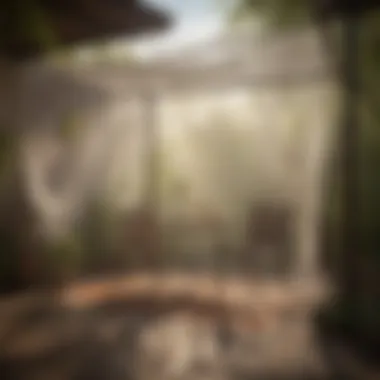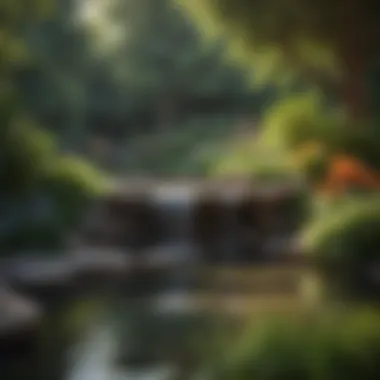Effective Ways to Keep Mosquitoes Out of Your Yard - Ultimate Guide


Preventive Pest Control Strategies
When it comes to keeping mosquitoes out of your yard, it's crucial to start with Preventive Pest Control Strategies. House Exterior Protection plays a pivotal role in warding off these pesky insects. Begin by sealing cracks around doors, windows, and foundations to prevent their entry. Clearing debris like stacked wood or old leaves eliminates potential breeding grounds for mosquitoes. It's vital to take proactive measures to stop pests from entering your home.
Yard Maintenance is another key aspect of mosquito prevention. Implement essential yard care routines such as regularly mowing grass and trimming vegetation to reduce mosquito hiding spots. Employ methods like removing standing water in birdbaths or flowerpots to keep your yard pest-free. A well-maintained yard not only enhances your property's aesthetics but also deters mosquito infestations.
Maintaining Indoor Cleanliness is essential for keeping mosquitoes at bay. Adopt expert cleaning tips and techniques to remove potential mosquito habitats within your home. By keeping indoor spaces clutter-free and regularly dusting and vacuuming, you can create a pest-resistant indoor environment that's less attractive to mosquitoes. Simple measures can go a long way in preventing mosquito intrusions.
Proper Garbage Disposal is critical in minimizing pest attractions. Efficient waste disposal methods like using tightly sealed trash cans help prevent odors from luring mosquitoes. Recognize the importance of disposing of garbage properly to deter not only mosquitoes but also other nuisance pests. By managing your waste effectively, you contribute to a cleaner outdoor environment.
Explore Other Pest Prevention Strategies to fortify your mosquito defense. Implement innovative ways to safeguard your home beyond traditional methods. Collaboration of these strategies ensures a comprehensive approach to preventing mosquito infestations.
Understanding Mosquito Behavior
Understanding the behavior of mosquitoes is crucial in devising effective ways to keep them out of your yard. By grasping the factors that attract mosquitoes and their reproductive cycle, you can implement targeted measures for mosquito control. This section delves into the intricacies of mosquito behavior, shedding light on their preferences and habits to aid in your quest for a mosquito-free outdoor area.
Mosquito Attraction Factors
Mosquito attraction factors play a vital role in drawing these pesky insects to your yard. Understanding the elements that entice mosquitoes can help you in implementing strategies to repel them effectively.
Standing Water
Standing water is a primary factor that attracts mosquitoes to breeding and laying eggs. The stagnant water serves as a perfect breeding ground for mosquitoes, facilitating their reproductive cycle. Taking steps to eliminate standing water sources around your yard can significantly reduce mosquito populations, making it less hospitable for their breeding.
Carbon Dioxide
Carbon dioxide is another crucial factor that lures mosquitoes to human environments. Mosquitoes are highly sensitive to carbon dioxide, which is emitted when humans exhale. They use this gas to locate their hosts from a distance, making it essential to consider in mosquito control strategies.
Body Odor
Interestingly, human body odor can also be an attractant for mosquitoes. Certain compounds in body odor can draw mosquitoes to individuals, making some people more prone to mosquito bites than others. Being aware of this factor can help you take additional measures to mask body odors that attract mosquitoes.
Mosquito Reproduction Cycle
Understanding the mosquito reproduction cycle is key to disrupting their lifecycle and reducing their presence in your yard. By targeting each stage of the cycle, you can effectively control mosquito populations and create a more comfortable outdoor environment.
Egg Stage


The egg stage marks the beginning of the mosquito's life cycle, where females lay eggs in water bodies. Removing or treating standing water where mosquitoes lay their eggs can prevent the hatching of larvae, breaking the reproductive chain.
Larva Stage
Larvae emerge from mosquito eggs and live in water, feeding on organic matter. Implementing measures to eliminate standing water or using larvicides can prevent larvae from maturing into adult mosquitoes, decreasing their numbers in your yard.
Pupa Stage
During the pupa stage, mosquitoes transition from larvae to adults in a cocoon-like structure. Targeting areas where pupae are present, such as stagnant water sources, can disrupt this crucial stage and reduce mosquito populations.
Adult Mosquito
The adult stage is when mosquitoes are fully developed and seeking hosts for blood meals. Employing barrier methods, repellents, or traps can deter adult mosquitoes from entering your yard, mitigating their presence and the risk of mosquito-borne diseases.
Natural Mosquito Repellents
Natural mosquito repellents play a crucial role in achieving a mosquito-free yard. By utilizing plant-based solutions, you can effectively deter these pesky insects without relying on harmful chemicals. Incorporating natural repellents not only helps protect the environment but also ensures a safer outdoor space for your family. Considerations such as sustainability, health impact, and cost-effectiveness make natural repellents a preferred choice for many homeowners seeking eco-friendly pest control solutions.
Plants that Repel Mosquitoes
Lavender
Lavender, known for its calming aroma, is a versatile plant that serves as an excellent mosquito repellent. Its fragrant flowers contain oils that naturally repel mosquitoes, making it a popular choice for yards and gardens. The key characteristic of lavender lies in its pleasant scent, which not only deters mosquitoes but also adds beauty to your outdoor space. The unique feature of lavender is its ability to attract beneficial insects while repelling pests, creating a balanced ecosystem. However, some individuals may find the scent overwhelming, which could be considered a potential disadvantage.
Citronella
Citronella, a well-known natural insect repellent, is derived from various types of lemongrass plants. This plant offers effective mosquito protection due to its strong citrus scent that masks human odors, deterring mosquitoes from landing. The key characteristic of citronella is its potent aroma, which serves as a powerful barrier against mosquitoes. Its unique feature lies in its versatility, as citronella can be used in various forms such as candles, oils, or planted directly in the garden. However, citronella plants require regular maintenance to preserve their effectiveness, which could be viewed as a potential drawback.
Marigolds
Marigolds, with their vibrant colors and distinct scent, are not only a visual delight but also serve as natural mosquito repellents. These annual flowers produce a smell that mosquitoes find unappealing, keeping them at bay. The key characteristic of marigolds is their bold and bright appearance, which complements any garden or yard. The unique feature of marigolds is their ability to repel a wide range of insects, making them a valuable addition to any pest control strategy. However, some individuals may be allergic to marigolds, so cautious handling is advised to prevent skin irritation.
Physical Barriers and Habitat Modification
In the realm of battling against the incessant threat of mosquitoes invading your yard, the utilization of physical barriers and habitat modification emerges as a pivotal strategy. By understanding the significance of this approach, homeowners equip themselves with essential tools to create a formidable defense system. Physical barriers, such as mosquito netting and screens, act as shields, impeding these pesky insects from infiltrating outdoor spaces. Habitat modification, on the other hand, involves altering the environment to make it less hospitable for mosquito breeding and resting. These combined tactics elevate the efficacy of mosquito control measures, ensuring a more peaceful outdoor experience.
Mosquito Netting and Screens


Installation Tips
When delving into the intricacies of Installation Tips related to mosquito netting and screens, attention to detail becomes paramount. The precise installation of these barriers is crucial to their effectiveness. Ensuring a tight and secure fit eliminates potential entry points for mosquitoes, fortifying the defense perimeter around your yard. Opting for high-quality materials and professional installation services guarantees durability and longevity, enhancing the overall protective capability. The unique feature of Installation Tips lies in their ability to provide a seamless shield against mosquitoes while seamlessly blending into the outdoor aesthetic. Despite their advantages, regular inspection and maintenance are essential to address any wear and tear promptly.
Maintenance
Within the spectrum of yard maintenance practices, the maintenance of mosquito netting and screens plays a pivotal role in preserving their functionality. Regular cleaning and inspection of these barriers are crucial to ensure they remain free from debris and damage. Maintenance not only extends the lifespan of these protective elements but also sustains their efficacy in keeping mosquitoes at bay. Additionally, repairing any tears or gaps promptly prevents potential mosquito intrusions, maintaining a robust defense system. Despite requiring attention and upkeep, the benefits of consistent maintenance far outweigh the minor inconvenience, providing long-term protection against mosquito infestations.
Yard Maintenance Practices
Remove Standing Water
A targeted approach to yard maintenance, such as the removal of standing water, proves to be a fundamental step in mosquito control. Standing water serves as breeding grounds for mosquitoes, making it imperative to eliminate stagnant water sources. The key characteristic of removing standing water lies in its ability to disrupt the mosquito life cycle, thereby reducing the insect population in your yard significantly. This practice not only diminishes the attractiveness of the environment to mosquitoes but also mitigates the risk of mosquito-borne diseases. Despite its simplicity, the impact of removing standing water reverberates across the entire mosquito control strategy, bolstering its overall effectiveness.
Regularly Mow Grass
As part of comprehensive yard maintenance practices, regular mowing of grass contributes significantly to mosquito control efforts. By keeping the grass trimmed to a shorter length, homeowners mitigate potential mosquito resting spots. Shorter grass not only limits the areas where mosquitoes can hide but also minimizes humidity levels, creating an inhospitable environment for these insects. The key characteristic of regularly mowing grass lies in its ability to disrupt the mosquito habitat, impeding their ability to thrive in the outdoor space. While the task of mowing may seem routine, its impact on mosquito control should not be underestimated, highlighting its essential role in fostering a mosquito-free yard.
Trim Vegetation
Trimming vegetation stands out as a strategic maneuver in combating mosquito infestations within your yard. Overgrown vegetation not only provides ample hiding spots for mosquitoes but also retains moisture, enhancing the breeding conditions for these insects. The unique feature of trimming vegetation lies in its ability to reduce potential mosquito habitats, creating a less inviting environment for these pests. By maintaining trimmed vegetation, homeowners effectively minimize mosquito populations and limit their breeding opportunities. While the task may require regular upkeep, the advantages of trimmed vegetation in curbing mosquito activity underscore its importance in holistic mosquito control efforts.
Mosquito Control Products
Mosquito control products play a crucial role in maintaining a mosquito-free yard. By utilizing effective products, you can protect your outdoor space from these pesky insects. In this section, we will explore the significance of mosquito control products, highlighting their various elements, benefits, and considerations.
Insecticides for Mosquito Control
Insecticides are essential tools in the fight against mosquitoes. They help eradicate adult mosquitoes and prevent their breeding cycles, contributing significantly to the overall goal of mosquito control.
Chemical Sprays
Chemical sprays are potent insecticides designed to kill mosquitoes on contact. Their key characteristic lies in their fast-acting formula that provides quick relief from mosquito infestations. Chemical sprays are favored for their immediate impact and ability to cover larger areas effectively, making them a popular choice for homeowners seeking rapid mosquito control solutions.
However, a notable disadvantage of chemical sprays is their chemical composition, which may raise concerns about potential health risks and environmental impact. Despite their effectiveness, users must exercise caution and follow usage guidelines to minimize adverse effects while harnessing the benefits of chemical sprays.
Mosquito Dunks


Mosquito dunks are biological larvicides containing a bacterium that specifically targets mosquito larvae in standing water. Their unique feature lies in their ability to kill mosquito larvae before they mature into biting adults, disrupting the mosquito growth cycle effectively.
A significant advantage of mosquito dunks is their targeted approach, which poses minimal harm to non-target organisms, making them an environmentally friendly option for mosquito control. However, one limitation of mosquito dunks is their specificity to larvae, requiring consistent application to achieve sustained results against adult mosquitoes.
Electronic Mosquito Repellent Devices
Electronic repellent devices offer a modern and convenient alternative to traditional insecticides. They work by emitting sound frequencies or light that repel mosquitoes, providing a non-toxic method of mosquito control for households.
Ultrasonic Repellers
Ultrasonic repellers emit high-frequency sound waves that are intolerable to mosquitoes, driving them away from the protected area. Their key characteristic lies in their silent operation and coverage of a broad expanse, making them a discreet yet efficient choice for mosquito prevention.
An advantage of ultrasonic repellers is their non-intrusive nature, allowing seamless integration into indoor and outdoor settings without disrupting daily activities. Nonetheless, the effectiveness of ultrasonic repellers may vary depending on factors like room layout and background noise levels.
Bug Zappers
Bug zappers lure mosquitoes and other insects using UV light and electrocute them upon contact. Their key characteristic lies in their ability to trap and eliminate flying pests, reducing mosquito populations effectively.
One advantage of bug zappers is their ability to work continuously without the need for chemical attractants, offering a chemical-free solution to mosquito control. However, an inherent limitation of bug zappers is their dependence on electricity, requiring a power source for optimal performance.
Professional Mosquito Control Services
When it comes to managing mosquito population in your yard, opting for professional mosquito control services can be a game-changer. These services offer expert solutions and effective strategies to tackle the pesky mosquito problem. Professional mosquito control services bring a wealth of experience and knowledge to the table, ensuring a comprehensive approach to mosquito abatement. By entrusting your mosquito control needs to professionals, you can benefit from targeted treatments and customized plans tailored to your specific requirements. The expertise of professionals in mosquito control is invaluable in creating a mosquito-free outdoor environment that you can enjoy throughout the year.
Mosquito Abatement Programs
Benefits
One of the key benefits of mosquito abatement programs lies in their proactive approach to mosquito control. By implementing regular mosquito abatement measures, you can significantly reduce the mosquito population in your yard, thereby minimizing the risk of mosquito-borne diseases. Moreover, mosquito abatement programs contribute to creating a safer and more comfortable outdoor living space for you and your family. The systematic nature of these programs ensures long-term effectiveness, providing lasting protection against mosquitoes. Another notable benefit is the use of environmentally friendly methods that are safe for humans and pets, making mosquito abatement programs a sustainable choice.
Considerations
When considering mosquito abatement programs, it is essential to assess the specific needs of your yard and surrounding environment. Factors such as the size of your property, the prevailing mosquito species, and your outdoor activities can influence the effectiveness of abatement measures. Additionally, it is important to choose a reputable provider with a track record of successful mosquito control solutions. While mosquito abatement programs offer numerous benefits, it is crucial to weigh the costs associated with these services against the advantages they provide. Understanding the scope of services offered and the expected outcomes can help you make an informed decision regarding the implementation of mosquito abatement programs in your yard.
Seasonal Mosquito Treatments
Frequency
The frequency of seasonal mosquito treatments plays a crucial role in maintaining a mosquito-free environment. Regular treatments at appropriate intervals help in controlling mosquito populations effectively. By scheduling consistent treatments throughout the mosquito season, you can prevent mosquito infestations and ensure continued protection for your outdoor space. The frequency of treatments may vary based on factors such as mosquito activity levels, weather conditions, and the surrounding landscape. It is advisable to consult with mosquito control professionals to create a treatment schedule that aligns with your specific needs and provides optimal results.
Effectiveness
The effectiveness of seasonal mosquito treatments is paramount in achieving desired outcomes. High-quality treatments that target mosquito larvae and adult mosquitoes can significantly reduce mosquito numbers in your yard. By employing proven mosquito control methods and advanced technologies, seasonal treatments offer reliable protection against mosquitoes. The effectiveness of these treatments is evident in the noticeable reduction of mosquito presence and bites, enhancing your overall outdoor experience. However, it is essential to follow recommended guidelines for application and consider factors that may impact treatment efficacy, such as rain or irrigation. By prioritizing the effectiveness of seasonal mosquito treatments, you can enjoy a mosquito-free yard and peace of mind throughout the year.



